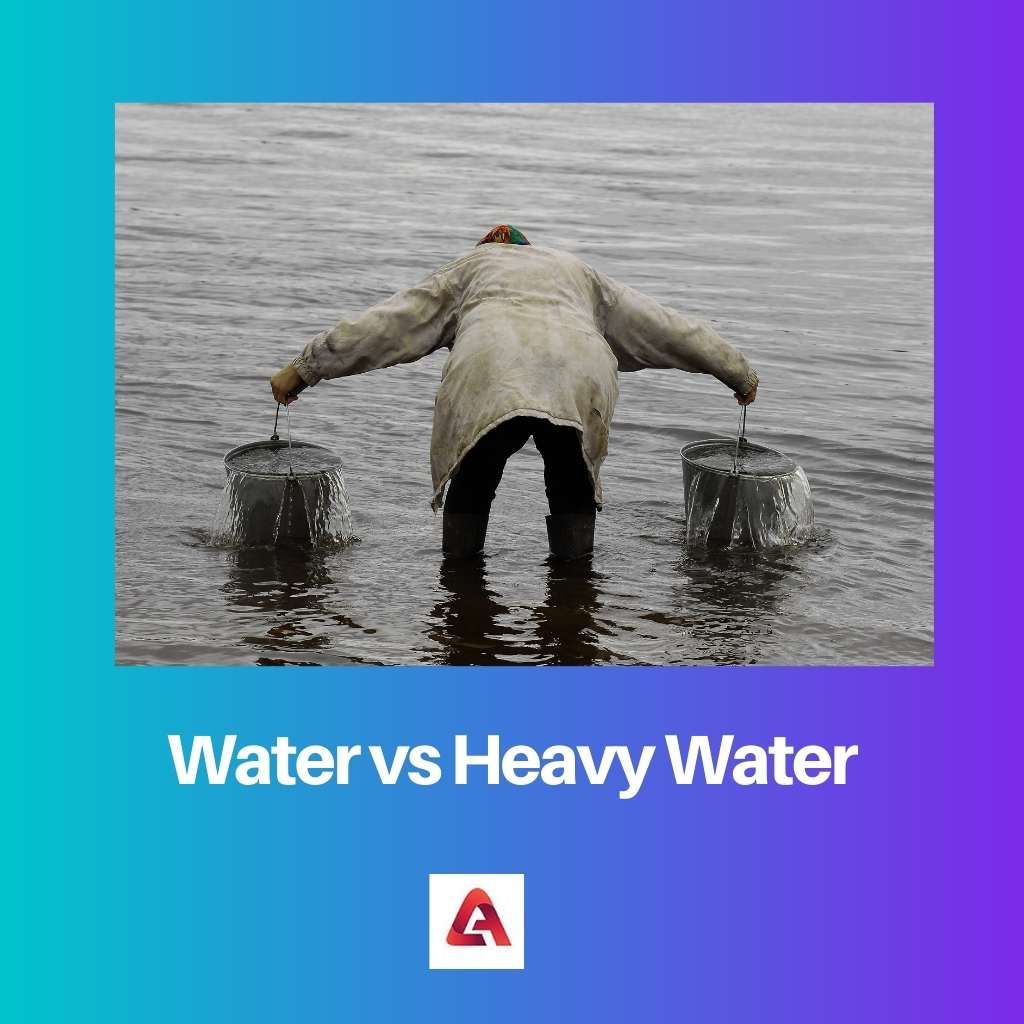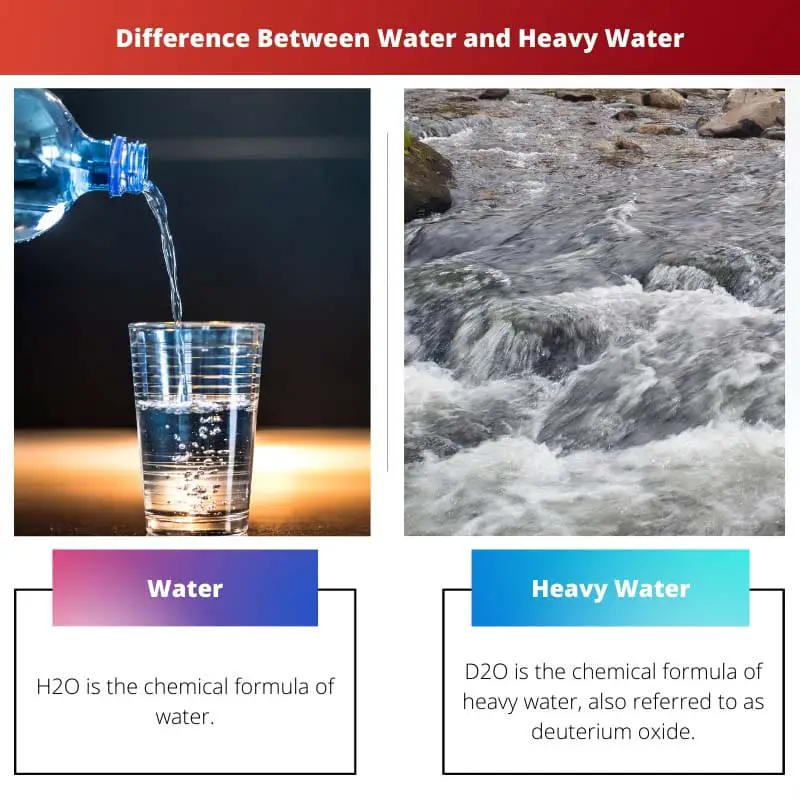Isotopes refer to those members of the same family who share the same atomic number and vary slightly in atomic mass. The isotopes of the same element will form different compounds in combination with another element.
The resulting compound slightly varies from the compound formed due to the combination of the isotope. These slight variations can also be noticed in water and heavy water.
Key Takeaways
- Water (H2O) consists of two hydrogen atoms and one oxygen atom, whereas heavy water (D2O) contains two deuterium atoms (a hydrogen isotope) and one oxygen atom.
- Heavy water is denser than regular water due to the additional neutron in each deuterium atom.
- Heavy water finds use in nuclear reactors as a coolant and neutron moderator, while regular water has a wide range of everyday applications.
Water vs Heavy Water
Heavy water contains a higher proportion of the isotope deuterium, instead of normal hydrogen atoms, which makes it “heavier”. Water (Nortmal water) is safe for human consumption and use, heavy water is not intended for drinking or regular use due to its properties.

For all living organisms, water is the source of life. Hydrogen and oxygen join as covalent bonds in a fixed proportion to form water. The structure of the molecule is bent, forming an angle of 104.5°.
Due to the high electronegative nature of oxygen atoms, oxygen atoms have a partial negative charge leading to the polarity of the O-H bond. Moreover, water molecules seem to aggregate on the surface in a short-range order.
As the name suggests, Heavy water contains heavier and higher hydrogen isotopes. At STP, heavy water has no colour. It turns into a colourless and odorless liquid at room temperature.
The mixture of regular and heavy water leads to the formation of a heterogeneous mixture. The electrolysis starts with a steel vessel as the cathode, a nickel sheet as the anode, and water and NaOH as the electrolyte. It was first discovered in 1932.
Comparison Table
| Parameters of Comparison | Water | Heavy Water |
|---|---|---|
| Chemical formula | H2O is the chemical formula of water. | Water has a thickness of 997 kilogram / cubic meter. |
| Molar mass | According to facts, it has a molar mass of 18g/mol. | Heavy water has a molar mass of 20g/mol. |
| Boiling Point | As facts say, it has a boiling point of 100 degrees Celsius. | Heavy water has a boiling point of 101.4 degrees Celsius. |
| Freezing Point | Water freezes at 0 degrees Celsius. | But heavy water has a freezing point of 3.8 degrees Celsius. |
| Density | Heavy water has a density of 1.11 grams / cubic centimeter. | Heavy water has a density of 1.11 grams / cubic centimetre. |
What is Water?
Water, covering a significant part of our earth, is a chemical compound composed of hydrogen and oxygen joined in a covalent bond. The behaviour of water is due to its properties, i.e., surface tension and viscosity. Water molecules also form hydrogen bonds.
One can find water in three states. Ice is the solid state formed by the freezing of water at 0°C. Water is the liquid form that covers about 71% of the earth. Water vapour is the gaseous state formed by boiling water at 100°C.
Water is colourless, odourless, and tasteless. Nearly all gases, sugars, salts, and acids easily mix and dissolve in water, which is known as a universal solvent.
When combined with other solvents, it leads to the formation of azeotropes. The surface tension, specific heat, and thermal conductivity of water are higher when compared to other fluids and liquids.
Moreover, water conducts meagre amounts of electricity. However, the addition of ionic substances leads to the formation of ions in the liquid, which increases its conductivity.
Water is essential for every moment of life. While 78% of our body is water, an average healthy human needs about 7 litres.
Besides the human body, water also plays a significant role in agriculture, maintaining pH, washing, and maintaining water balance on earth.

What is Heavy Water?
Deuterium oxide, also known as heavy water, is a chemical compound composed of deuterium and oxygen. Deuterium is a heavy isotope of H2, i.e., hydrogen, and thus has a higher atomic mass.
Thus, heavy water’s molar mass is higher than normal water’s. Due to deuterium’s presence, heavy water’s properties (i.e., both chemical and physical) differ slightly in comparison to regular water.
Heavy water has a molecular mass of 20.02 grams/mole, a 1.107 g/mL density, and a dipole moment of 1.87 D. Moreover, the melting point of heavy water is 3.82°C, and its boiling point is 101.4°C.
An alkali leads to the formation of heavy water in the presence of water electrolysis. Moreover, heavy water is again categorized into semi-heavy, heavy-oxygen, and tritiated water.
Semi-heavy water, also known as HDO, contains the chemical composition of one deuterium, one protium, and one atom of oxygen.
The presence of heavier oxygen isotopes in heavy-oxygen water leads to its name. Tritiated water, also known as T2O, is super-rich water and radioactive due to tritium (the heaviest isotope of hydrogen).
Main Differences Between Water and Heavy Water
- The chemical consumption of water includes two atoms of hydrogen combined with one bit of oxygen. The chemical composition of heavy water includes two atoms of deuterium combined with one atom of oxygen.
- Water has a broader structure owing to its hydrogen bonds. On the contrary, heavy water is tetrahedral due to the higher number of hydrogen bonds present per heavy water molecule.
- Due to the low density, ice cubes made of water will not sink; instead, they will float on water. But, owing to the high density, ice cubes made out of heavy water will sink in water.
- Water has a pH of 7, which says that it’s neutral. But, heavy water has a pH of 7.44, which makes it a weaker acid.
- Water is life for every living organism. From drinking to daily chores, water is essential for every activity of human life. Water is synonymous with survival. But, the use of heavy water is found in nuclear waters. Moreover, excessive consumption of heavy water can prove fatal.




